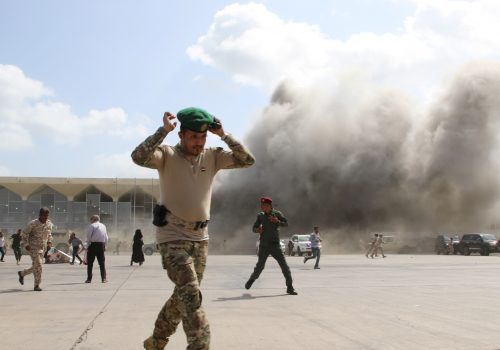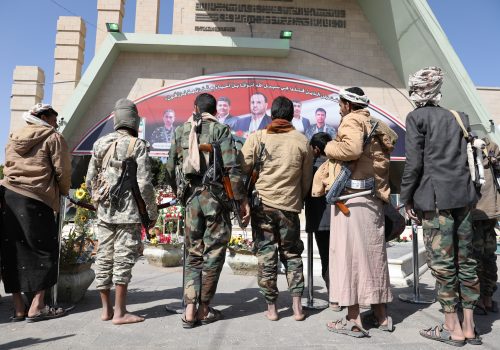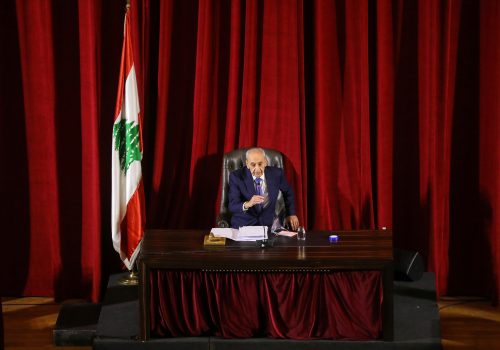A historic opportunity for peace in Yemen
The Joe Biden administration came into office primed to change directions in the Gulf, with a particular focus on ending the war in Yemen. Despite being part of the Barack Obama administration that greenlit and supported the Arab coalition’s military intervention in Yemen in 2015, President Biden changed course by ending US support of the coalition’s intervention and giving Yemen top priority—partly due to the pressure applied by the progressive wing of the Democratic party to take the country’s humanitarian plight seriously.
After the strong mention of Yemen in his first foreign policy address on February 4, the Biden administration immediately announced the appointment of Tim Lenderking as US Special Envoy to Yemen to coordinate peace efforts and diplomatically engage the US in ending the world’s worst humanitarian disaster. The road ahead will be difficult, but a historic opportunity has presented itself with a new and determined administration in the White House. The decision to withdraw all US military, logistical, and intelligence contributions to the war effort in Yemen was a dramatic first step in that direction.
If the Biden administration’s peace efforts in Yemen are successful, US diplomacy will have made a comeback and the president’s words about leading by example would have real substance. To boot, peace in Yemen would contribute considerably to lessening tensions in the Gulf region and pave the path for a different and more constructive relationship with Iran. For that to happen, the Biden administration must find the middle ground between the hubris of power—exhibited in the 2003 US invasion of Iraq—and the paralysis that can result from an excessive focus on the limits of intervention.
Fearful of repeating the mistakes of the invasion of Iraq, the Obama administration hesitated in assisting the 2011 Arab uprisings. Consequently, the administration ended up oscillating between providing limited and mostly moral support to the revolts across the Middle East and North Africa while maintaining security ties with the authoritarian regimes resisting change. In the case of Yemen, a great power like the US trying to help must also navigate a realistic course with a clear strategy.
The three levels of the Yemen conflict
As I’ve mentioned in a previous article for the Atlantic Council, there are three levels of the Yemen conflict: the national, regional, and international. Of the three, the most difficult is the national level. Whereas the US can boldly use its influence with international actors, Yemen’s delicate internal balance is not a natural terrain for any foreign power—let alone a country like the US, which is seen as having taken sides in the struggle.
The Trump administration’s listing of the Houthi rebels as a Foreign Terrorist Organization (FTO) in January—which the Biden administration reversed—only highlighted the US involvement on the side of the Arab coalition since the war started. The best assistance the US can render is to convince all foreign powers—mainly the five permanent members of the UNSC—to stop fueling the war with arms sales and weapon transfers and to deploy their diplomacy to help end the war instead. Only then could the international community truly turn swords into plowshares and help the people of Yemen emerge from devastation to rebuild their country.
At the regional level, the Arab coalition partners and Iran will need to be engaged in reducing regional tensions, starting with the cessation of hostilities in Yemen, ceasing the shipments of arms to their allies in the country, and alleviating each other’s fears regarding the proliferation of missiles and weaponized drones. In addition to their often divergent security concerns, Saudi Arabia and the United Arab Emirates (UAE) should postpone some of their economic and commercial interests in Yemen until a new post-war government is formed in the country.
The international level of this conflict can best be addressed by beginning with the United Nations Security Council (UNSC). Members of the UNSC should not revisit previous Yemen resolutions but agree on collaborating for peace and issuing a call to end all acts of violence in in the country. The UNSC must not presume to define the parameters of peace or go back to judging who was to blame for the conflict. Rather, the task should be to get security council members’ arms merchants to cease and desist from supplying weapons and military expertise until the war has stopped and peace talks are seriously underway. Only the US can launch such an initiative to convince China, Russia, and European states to join in a major push for peace.
How US diplomats can wade through Yemen
The internal struggle for power in Yemen is, of course, how the conflict started and where it will have to end. The Houthis began their six-year struggle against the central government of late President Ali Abdallah Saleh in 2004. When his government fell due to the 2011 uprising in Yemen, it paved a path for the Houthis to take over the capital Sanaa in 2014 and, later, a failed bid for total control of Yemen. Today, the Houthis control roughly 25 percent of the territory of Yemen, but 80 percent of its 29 million population. The group will demand, at the very least, a major role in any future government and access to a seaport for their region.
Though more disjointed than joined, the opposition to the Abdrabbuh Mansur Hadi government—known as the Joint Meeting Parties (JMP)—has remained viable and contests President Hadi and his government’s support of the General People’s Congress on most political issues. The other power to contend with is the Southern Transition Council (TNC), representing the southern opposition to the central government in Sanaa. While diverse and not unified under a single banner, the southern opposition is nevertheless serious in its demands for autonomy and/or outright independence from the north.
For American diplomats, wading through internal Yemeni issues with the hopes of settling their differences will be a daunting task. To begin with, US Special Envoy Lenderking and his team will need to talk to all concerned parties, some of whom Washington has not had much dealings with in the past. Language skills will be paramount as discussions lose much in translation. It’s important to note that the US comes in at a disadvantage, as many Yemenis see it as an arrogant hegemonic power. A middle ground will have to be struck between the remaking of Iraq after the 2003 invasion and subsequent occupation and a hands-off policy of neglect in Yemen which has prevailed in recent years. Regardless, US diplomats need to be directly involved. The Biden administration can provide its good offices and mediate in Yemeni affairs with the assistance of Oman and Qatar—two countries that have enjoyed a long history of mediation in the region and are generally regarded by Yemenis as benign powers.
Only the US can step in and provide the leadership—which has been missing for the past six years since the coalition’s intervention began—to move all the parties of the Yemen conflict towards peace. By the same token, all groups and countries that have played a role in the conflict must cooperate and make their own contribution to the peace effort. There is a hard and complex road ahead, but the Biden administration has taken a major first step in the right direction.
Nabeel Khoury is nonresident senior fellow at the Atlantic Council’s Rafik Hariri Center for the Middle East.
Image: Houthi soldiers walk past the the U.S. embassy's gate following a demonstration against the United States over its decision to designate the Houthis a foreign terrorist organisation, in Sanaa, Yemen January 18, 2021. REUTERS/Khaled Abdullah


